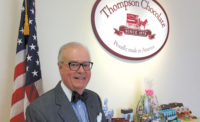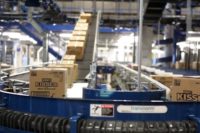When Ellen Gordon asked me during our interview if I wanted to see the plant, I, of course, didn’t hesitate. After all, who wouldn’t want to tour Tootsie Roll Industries (TRI)’s largest facility and see its iconic brands in production?
The minute we were in the golf cart, employees waved and smiled at the 83-year-old woman heading the company. I casually mentioned that she knew many of the employees.
“Oh, I know all of them,” she responded. It wasn’t long before she whisked me to the Tootsie Roll production area to view a continuous slab of that wonderful chocolate-like confection falling onto a conveyor belt. Gordon, who already had put on gloves, took a pinch from the slab and gave it to me. It took just a second to savor that warm Tootsie Roll. Just heaven!
We then passed the Dots production area, Gordon stopping to check on the fresh chewy gumdrops heading toward the packaging area. Again, she grabbed a few and put a handful into my hand. What can I say, there’s nothing like a fresh Dot coming off the line and travelling directly into one’s stomach. Now that’s what I call a flavor burst!
Next, we stopped by the adjoining packaging line where the cooled Dots were being filled into theatre boxes at a rate of 250 boxes per minute. A robotic pic ‘n place unit placed the sealed boxes into cartons before they were packed and coded for eventual palletizing and shipment.
It had been awhile since I toured the TRI plant in Chicago, the last time coinciding with Melvin Gordon receiving Candy Industry’s Kettle Award in 2009. Thus, Ellen’s invite for a quick tour was to provide me with an update on the millions of dollars that had been invested into the facility (as well as the six other plants) during the ensuing six years.
Ongoing improvements and investments in manufacturing is an operating principle that she and Melvin strongly believed in, and one that continues to be part of the company’s operating strategy. His passing on January 20, 2015, although unexpected — he was 95 and in good health until his last month — didn’t mean that Ellen or the company was unprepared for that eventuality.
“It was a fairly short illness and we were hopeful he’d recover,” she says. “We all miss him. He was very much a presence, always thinking, teaching, imparting his guidance.”
That guidance goes back nearly 65 years; on June 25 Ellen and Melvin would have celebrated their 65th wedding anniversary.
“I was 18 years old and he was 30,” she recalls. “I was finishing my sophomore year in college and a mutual friend introduced us during the Christmas break. I liked him. He was a very funny guy, witty. He always had great one-liners.”
The Harvard University grad and former U.S. Army 1st lieutenant was involved in his family’s textile business in Manchester, N.H. The former Harvard football and baseball player — Melvin actually played against 1940 Heisman Trophy winner Tom Harmon from the University of Michigan, albeit in a losing cause (26-0) — soon realized he had found his soulmate and the two wed after a six-month courtship on June 25, 1950.
Ellen transferred from Vassar College in Poughkeepsie, N.Y. to Wellesley College in Massachusetts to continue her studies as well as be near her husband’s home in Boston. She eventually enrolled in Harvard University’s graduate program in linguistics. It was during the course of raising a family that Melvin was introduced to the then-named Sweets Co. in 1962.
“My father [William Rubin] became ill,” explains Ellen, “and he asked Melvin to come in and help run the business. He was still working at his father’s business as president of the company at the time, so he was a busy man.”
Upon joining the company as chairman and ceo, Melvin set to work to grow the company. Four years later, he changed the name to Tootsie Roll Industries after its leading product and made the decision to move the operation from Hoboken, N.J. to Chicago, the candy manufacturing capital of the United States.
“We had outgrown the facility in New Jersey and he found this remarkable place on the Southwest Side of Chicago,” Ellen says. The 2.3-million-sq.-ft. building, which was used to build engines for the World War II B-29 Superfortress bombers as well as automobiles for the Tucker Car Corp., would once again be home to technological innovation, although this time, of a sweeter nature.
It was during this time that Ellen joined the company full-time.
“I was a math major, so I was good with numbers,” says Ellen. “My duties involved treasury functions, such as investments, pension and retirement plans. I then became involved in product development and quality assurance.”
Upon moving the corporate offices to Chicago in 1970, the company shortly thereafter made its first major acquisition: the Mason Co., manufacturer of the famous Dots confections. It was the beginning of a three-part growth strategy that still remains intact: new products and line extensions, acquisitions and continuous investments in ongoing automation and technology.
The acquisition process continued to evolve and expand TRI, the company purchasing Cellas Chocolate Covered Cherries in 1985, Charms in 1988, the Warner Lambert brands (Junior Mints, Sugar Daddy, Sugar Babies andCharleston Chew) in 1993, Fluffy Stuff Candy Co. and Andes Candies in 2000, and Concord Confections in 2004.
Each acquisition was followed by a heavy dose of capital expenditures, be it moving the product lines to the Chicago plant or investing in automation at the existing manufacturing facility. And, each acquisition was done in partnership.
“The information about any kind of possible acquisition would come onto my desk first,” Ellen explains. “But it would very quickly land on his desk.
“Melvin and I had a rule,” she continues. “We only moved on a deal or investment when we both agreed. Naturally, when we would have different opinions, and the other felt strongly about moving forward, that person would lobby the other. In the end, however, we always came together and agreed. It was very much a very smooth partnership. We were lucky, but we also worked really hard at it.”
That partnership also extended toward re-investing in the business. Technology and automation remain another key element of the company’s growth strategy.
“We were into computers from the very early days,” she asserts. “Well before Oracle became a multibillion hardware and software company, we were a client of theirs in using relational databases. We were even a beta site for them.”
Thus, in addition to automating the processing and packaging end of confectionery manufacturing, TRI has been active in automating its systems, everything from procurement and inventory management to human resources and logistics.
“I love technology,” Ellen says. “I’m excited about the new automation that we’re now considering.”
As she points out, “I love the machinery shows. We would look at the robots when they first came out. Back then, however, we couldn’t rationalize the payback. Today, however, we’ve adapted robots to perform a variety of tasks involving candy making. We’ve also added high-speed baggers, case packers and are incorporating robotics wherever we can.
“I used to say that we have state-of-the-art manufacturing facilities, but Melvin would correct me and say that it’s beyond state-of-the-art.”
Last year, the company appropriated $16 million for capital expenditures. It expects to do the same or more for 2015. And it’s also in the hunt for acquisitions.
“We’re always looking at acquisitions, at brands that would fit into our family of products,” she asserts.
And the company continues to work hard at rolling out new products.
“We have three ‘hot’ items that are being shipped to retailers as we speak,” Ellen says. “First, there are Tootsie Fruit Chew Pops, which are fruit-flavored lollipops with our Fruit Roll centers. We have our Charms Boutique Pops, which feature flavors such as Strawberry Cheesecake, Crème Brulee, and Root Beer Float, and finally Dubble Bubble Dugout Gum.
And how is Ellen handling the additional responsibilities now that Melvin is gone?
“I’ve assumed some of those responsibilities, delegated others to our management teams, and we work together on getting things done,” Ellen says.
Interestingly, that was one of the things that Melvin admired about her, she adds.
“He admired my ability to create a big list every day and work at getting those tasks done.”
As for Ellen and what she admired about Melvin?
“He had the highest ethical standards,” she says. “He loved issues and loved to work things through. He was always writing letters to the editor, many of which were published. And he wrote a book, Better than Communism, which discussed what life would be like after communism.”
Add to that list musician and songwriter as well. Melvin wrote about 65 big band scores, some of which were even recorded. In fact, he even wrote a song for Ellen when she became Candy Industry’s 1985 Kettle Award recipient.
“It was a great honor and I was very excited, and he was very proud of me receiving it,” she adds. “It’s just wonderful seeing all those other people who are recipients, a celebration of a very high standard. You feel a closeness and a sense of pride in being part of the industry. Melvin was also very proud that he received the award.”
But what about the future?
“Our four daughters are involved in the company. They attend the Board of Directors meetings and various management meetings,” Ellen points out. “All four are very accomplished, and we discuss the business all the time. Our grandchildren have all also worked at the company. We’re a very close family and we see each other often.”
Besides, as Ellen points out, the company continues to be run according to its “principles,” which are codified in the annual report.
“We’ve always believed that the best investment is our investment in our own company,” she asserts. “And we always say that we run the company with the rigor and professionalism of a public company, but with the heart and vitality of a private company. We’ll continue to do things that ensure that we’re around for generations to come.”
It’s what Melvin would want.










